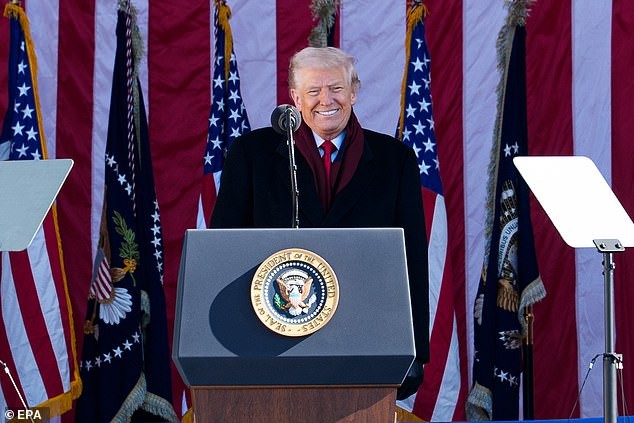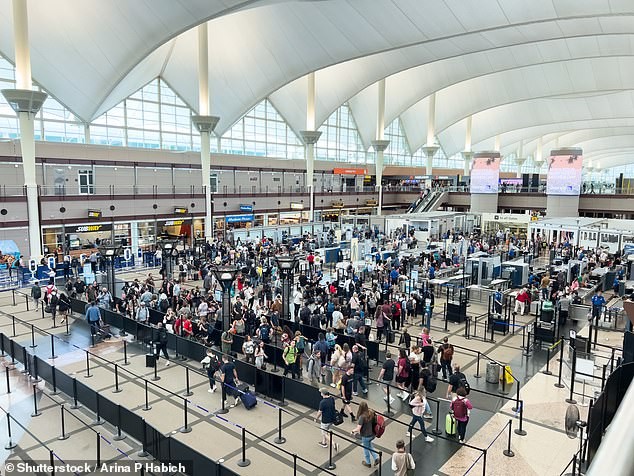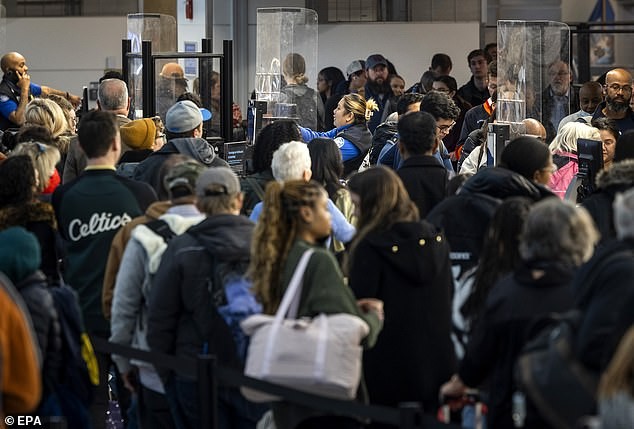Bombshell Leak Reveals Trump Plan to Bar Overweight Foreigners From Entering the United States
Donald Trump's State Department has issued guidance recommending that overweight people be denied immigrant visas to enter the United States. The directive, part of several measures the Trump administration has floated to crack down on unwanted travel to the United States, names obesity as part of several medical conditions that could incur expenses. Those medical conditions include 'cardiovascular diseases, respiratory diseases, cancers, diabetes, metabolic diseases, neurological diseases and mental-health conditions,' in addition to obesity, the guidance reads. Officials are told to ask: 'Does the applicant have adequate financial resources to cover the costs of such care over his entire expected lifespan without seeking public cash assistance or long-term institutionalization at government expense?' Being overweight is connected to asthma, sleep apnea and high blood pressure, health experts have said. They cite how those conditions 'can require hundreds of thousands of dollars' worth of care' and could potentially put strain on the US healthcare system.

State Department Guidance Targets Immigrant Visas for Overweight Applicants
The directive is about immigrant visas, not non-immigrant visas for those who can support their medical treatments and are going back to their home country, a State Department official said. The State Department has made multiple moves to beef up standards for those trying to obtain work visas in the US since Trump returned to the White House. Washington has imposed a $100,000-a-year fee to H-1B visas for skilled workers. H-1B visas, which require at least a bachelor's degree to obtain, are designed for high-skilled jobs which companies are struggling to fill. While critics have argued that the visa is damaging to the American workforce, its supporters, including Elon Musk, have claimed that it is vital for attracting high-skilled global talent. Trump's new order will only be applicable for new visa requests, with the annual payment for each applicant required by companies for up to six years. A separate order signed by the president saw the introduction of a new 'gold card' designed to help fast-track certain visas for those willing to 'make a significant financial gift'. Up to 80,000 'highly valuable' gold cards are set to be readily available, with the program currently in its 'implementation phase', according to US Commerce Secretary Howard Lutnick. The State Department has made multiple moves to beef up standards for those trying to obtain work visas in the US since Trump returned to the White House. At present, H-1B visas come with a number of administrative fees that come to an estimated total of $1,500. Lutnick insisted that he had 'spoken' with all of the big companies and that they 'are on board' with the new mandatory payment. Explaining the new policy, Trump said: 'The main thing is, we're going to have great people coming in, and they're going to be paying.' Trump has had the H-1B program in his sights since his first term in office, however he faced several court challenges to his earlier approach, which targeted the types of jobs that qualify. During his first term as president, Trump unveiled a 'Hire American' policy that directed changes to the program to try to ensure the visas were awarded to the highest-paid or most-skilled applicants. In December, the president appeared to temporarily U-turn on his views, siding with technology bosses in support of the visa and telling the New York Post he has 'always liked the visas'. 'I have many H-1B visas on my properties. I've been a believer in H-1B. I have used it many times. It's a great program,' Trump said at the time. However, he has previously branded the visa as 'very bad' and 'unfair' for US workers. The US currently awards 85,000 H-1B visas annually on a lottery system, with India understood to account for around three-quarters of these recipients.

Global Travel Restrictions and the Broader Immigration Crackdown
Trump signed an executive order in September imposing a $100,000-a-year fee to H-1B visas for skilled workers. A separate order signed by the president saw the introduction of a new 'gold card' designed to help fast-track certain visas for those willing to 'make a significant financial gift'. Data obtained by the US Citizenship and Immigration Services (USCIS) indicated that applications for the immigration visa for the upcoming fiscal year fell to around 359,000, the lowest figure in four years. Trump has also imposed a full ban on nationals from 12 countries, and partial restrictions for visitors from another seven countries earlier this month as part of an ongoing effort to rid the United States of foreign threats and secure the borders. Nationals of Afghanistan, Chad, Congo, Equatorial Guinea, Eritrea, Haiti, Iran, Libya, Myanmar, Somalia, Sudan and Yemen were barred from entering the United States from June 9. Citizens of Burundi, Cuba, Laos, Sierra Leone, Togo, Turkmenistan and Venezuela are partially restricted from traveling under the order, removing access to all immigrant visas and several non-immigrant travel options. 'We don't want 'em,' Trump said bluntly in a video released shortly after the ban was announced. 'Very simply, we cannot have open migration from any country where we cannot safely and reliably vet and screen.' White House Deputy Press Secretary Abigail Jackson wrote on X: 'President Trump is fulfilling his promise to protect Americans from dangerous foreign actors that want to come to our country and cause us harm. These commonsense restrictions are country-specific and include places that lack proper vetting, exhibit high visa overstay rates, or fail to share identity and threat information. 'President Trump will ALWAYS act in the best of interest of the American people and their safety.'


